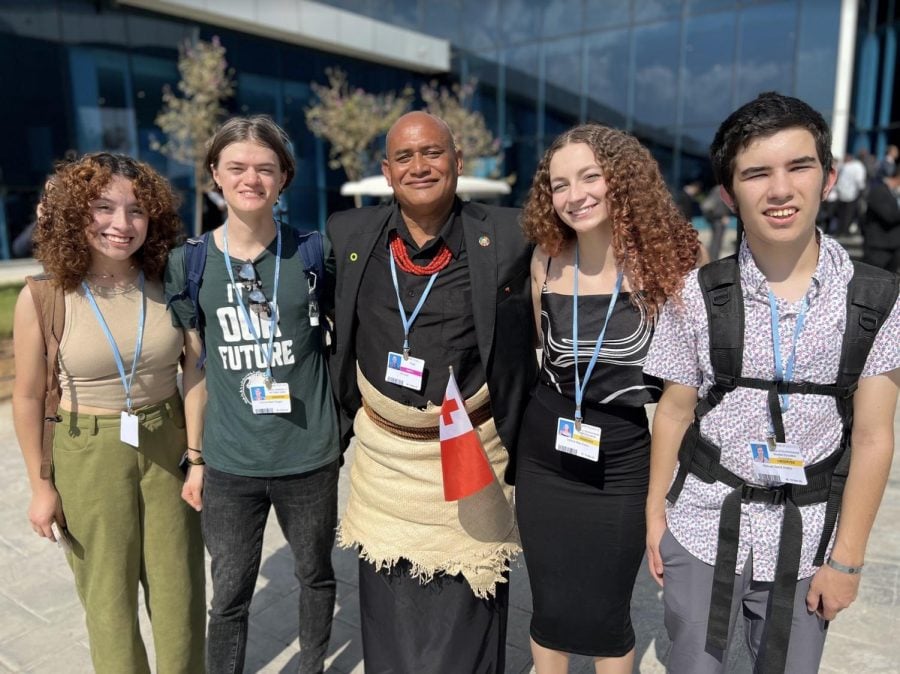Q&A: ETHS climate activist Emmet Ebels Duggan talks COP27, youth activism
Photo courtesy of David N. Sattler
Emmet Ebels Duggan, second from left, and three other members of It’s Our Future Youth with Tongan delegate Uili Lousi at COP27.
November 17, 2022
Emmet Ebels Duggan spent last week speaking with global climate leaders in Sharm el-Sheikh, Egypt.
A senior at Evanston Township High School and the hub coordinator for E-Town Sunrise, Ebels Duggan has advocated for climate solutions for about three years. They joined It’s Our Future, a Chicago-area organization that mentors young climate activists, in September 2021.
And at the beginning of November this year, they traveled to the 27th United Nations Climate Change Conference — commonly called COP27 — with four other students from It’s Our Future to interview government officials and other attendees and build community with activists.
There, Ebels Duggan said they primarily explored “pavilion” displays, hearing from the presidents of Botswana and Zimbabwe and learning at the Pacific Islander and Indigenous People’s pavilions, in particular. They flew home with the other students Saturday, though the conference is continuing.
The It’s Our Future group is now planning to compile their interviews into a short film for the One Earth Film Festival. The Daily spoke with Ebels Duggan about their experience at the conference and their takeaways for activism in Evanston.
This interview has been lightly edited for clarity and brevity.
The Daily: What changes do you want to see from COP27?
Ebels Duggan: One of the biggest topics at COP is loss and damage: the idea of richer countries that have contributed more to emissions and climate change providing financial contributions — a separate fund for countries that have suffered the most from the effects of climate change.
The fact that we are already at the stage of repaying the things that have already gone wrong is frustrating, and frankly, scary. (But) I’m hopeful that this COP will end with some significant commitment to loss and damage funding.
The Daily: As a climate activist, what was it like to be surrounded by all these people working in a field you care about?
Ebels Duggan: Being in an environment where you know everyone cares about the same thing as you do, where you’re all there for that thing, is special. It’s not something that you can replicate very easily. It’s something that is arguably worth flying across the world for.
The Daily: Are there moments from the conference that stood out to you?
Ebels Duggan: A thing to understand about COP: This event is sponsored by Coca-Cola, which should tell you a lot of what you need to know. It’s a corporate event. And it is a corporate event that does a better job of addressing climate change than those that don’t. But it’s also an event that a lot of countries and companies are able to take advantage of to greenwash their contributions to global emissions.
There are meeting rooms that have the Shell logo on the door, and nothing radicalizes you faster than that. The first few days, there were empty Coca-Cola branded fridges everywhere, and it was only on Thursday and Friday that those fridges were stocked with soda — in glass bottles. That’s one thing that stands out.
The Daily: Do you think there’s potential for change outside a corporate environment?
Ebels Duggan: A big part of what I have experienced in Evanston in my work with Sunrise has been that when you can talk directly to the people that you want to talk to, that need to be doing certain things, when you can have interpersonal relationships with them — that is where the most effective change and the most effective work in climate justice comes from.
That looks like working in our communities, working with our city and county governments, and even state governments, which are often far more accessible than one might think.
The Daily: What role do you think high school and college students should be playing in affecting change?
Ebels Duggan: Youth activists aren’t the answer to everything, nor should we be. A big part of It’s Our Future is the fact that we have a team of experienced older people who have done this kind of work for a long time, who can guide us.
What youth high school and college students bring is this just unrelenting, idealistic energy. The idealism can often be frustrating — to me, and I’m sure to those in power, who need to, by definition of their jobs, make compromises.
But I think that the fact that youth movements tend to have this just unrelenting energy of, ‘No, you can do that. You have to do that. Go do that,’ is just really crucial in getting the people in power to do some of that. If we are yelling at you loud enough that you need to do all of x, you will do some of x.
Email: [email protected]
Twitter: @avivabechky
Related Stories:
— ETHS student activists lead first Climate Justice Conference
— ETHS students walk out to call for sustainability coordinator, intergenerational advocacy
— How Evanston activism has survived through virtual action


